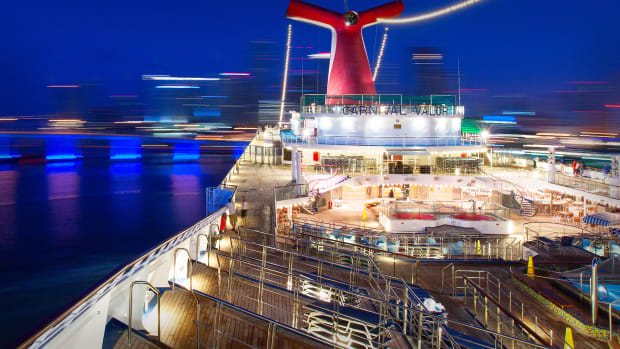With the United States government dropping mandatory covid tests for international travelers, the cruise industry remains the only travel business that still requires testing.
The decision by the Centers for Disease Control, which takes effect June 12 allows people to fly to the U.S. without taking any sort of covid test, which should lead to an increase in travel.
That's good news for cruise lines as "in 2019, more than 1 million guests from Canada sailed from a U.S. homeport, 570,000 guests from Brazil sailed from a U.S. homeport, and 280,000 from Mexico, the Caribbean, and Central America," Cruisehive reported.
More passengers from around the world will be able to get to the U.S., but actually getting on a cruise ship will still require taking a covid test no more than two days before the day they sail. That rule remains in place and the Cruise Line Industry Association (CLIA) -- a trade group which represents the interests of Royal Caribbean International (RCL), Carnival Cruise Line (CCL), Norwegian Cruise Line (NCLH), and most major cruise lines around the world -- has called for the CDC to review the rules under which cruise ships are now voluntarily operating under in partnership with the federal agency.

Image source: Shutterstock
CLIA Wants Cruise Lines Treated Like Other Travel
The covid testing changes for international travel were not made because covid has stopped being a threat. People still get sick, but the current levels of serious illness make it so that plenty of hospital beds remain should anyone need them. It's fair to call the CDC decision an economic one based on the needs of the travel industry.
Hotels, theme parks, and airlines want international travelers and they have much more leverage over the CDC than cruise lines given that they are U.S.-based businesses while cruise ships are not. That's why the cruise lines remained fully closed from U.S. ports while people packed Disney World, concerts, and hotel conference centers.
Cruise lines, however, do have a large economic impact on the U.S. economy, however, and the CLIA wants the cruise industry -- which has not suggested it plans to drop vaccine requirements -- to be treated like other travel businesses.
“As the CDC monitors the improving health landscape and works with airlines to support a smooth transition with the lifting of the pre-arrival testing requirement, we believe a review of pre-embarkation testing requirements for cruise travelers is also in order,” Cruisehive reported.
Royal Caribbean, Carnival, Norwegian, and even Disney (DIS) require that all passengers ages 12 and over must prove vaccination before boarding.
Cruise Lines Face a Higher Standard
If you get covid at Disney World, a concert, or your local grocery store, it's very hard for anyone to know exactly how they got infected. When people spend a few days or longer on a cruise ship, that gives covid time to incubate, spread, and produce visible illness.
That creates an optics problem for Royal Caribbean, Carnival, Norwegian, and other cruise lines. News footage of ships with high numbers of people infected with any virus -- be it flu, covid, or something else -- make for stories that make it seem that cruises are more dangerous than other forms of travel.
It's possible that was true in the days before the covid pandemic, but now cruise lines require proof of vaccination which few other venues or travel destinations do. Cruise lines also have enacted even more strict cleaning policies and hand washing has always been something Royal Caribbean, Carnival, and Norwegian push (usually with singing in front of the buffet).
Having to test before boarding a cruise ship for asymptomatic people adds a layer of complexity to people taking a cruise -- especially those who choose to fly in a day or two before. Removing the requirement would likely lead to more people cruising. That's good for the economy and makes as much sense with covid still being an issue as dropping the testing requirements for international travelers.
If money can be the reason why testing and vaccination requirements don't exist in hotels, airplanes, theme parks, concerts, and sporting events, then money should be a viable reason to consider dropping the testing requirement before taking a cruise.







